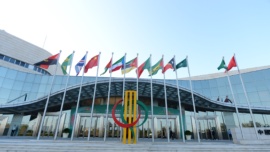Last week, I raised questions about the usage of the word eugenics in the Five-Year document under public review. (Reminder: the document states, on page 55 of the Portuguese version, as part of the demographic policy, the governments intention to incentivise couples to have more children applying the concept of eugenics.) Eugenics is a politically and historically charged word, even if we leave the Nazi connotations aside. The Portuguese language newspaper Ponto Final approached the department in charge and got some answers. They failed, however, to allay the concerns and added a couple of them. What did they say? First, that the intended meaning of the Chinese expression was – I quote – to improve the health of newborns through medicine and prenatal care. Second, that a Portuguese-Chinese dictionary (unidentified) and the Encyclopedia Britannica both supported such (neutral?) interpretation and made no link to Nazi-era policies. I cannot check and comment upon the undisclosed dictionary, obviously. But Britannica is easily accessible. The first paragraph of the related online article starts by declaring that Eugenics [is] the selection of desired heritable characteristics in order to improve future generations, typically in reference to humans. And ends by saying it ultimately failed as a science in the 1930s and 40s, when the assumptions of eugenicists became heavily criticised and the Nazis used eugenics to support the extermination of entire races. Therefore, the justification (or dismissal) fails patently on both counts. The status and pedigree of the idea are fully explained in the first paragraph. Nowhere is there any reference to perinatal care. They also claimed the characters used in the Chinese version have a different meaning. Maybe. My Chinese skills, or lack thereof, prevent me from going too far down that road. It still mystifies me that all the Chinese dictionaries I could find online that include the word translate it, consistently, as eugenics. We must conclude that, at the very least, the concept, as used in the plan, is fuzzy, not fully defined. It would be wiser, may I suggest, dropping it. And improving perinatal care, a worthy and desirable aim, should be better dealt together with health topics. Words matter, ideas matter: what the government actually means and what are the policy implications of the wording choices are not trivial matters. Proper use of words – and the clarity of ideas and purpose that comes with it does matter.
Top Stories
RELATED ARTICLESMORE FROM AUTHOR
Enhancing Macau’s Role as a Bridge between China and Portuguese-speaking Countries for Building a Community...
By Liu Xianfa, Commissioner of the Ministry of Foreign Affairs of the People’s Republic of...
OPINION – Enhancing Tourist Experience and Protection: Recommendations for the Historic Centre of Macau
Macau, as a travel destination, is world-renowned for its vibrant entertainment gambling, rich cultural heritage,...
OPINION – The Influence of Many, the Power of One
In January of this year, I reached out to my Corporate Social Responsibility expert colleagues...
OPINION – Blue natural assets
The sea seems cheap. Water does not have to be built (like railways) or repaired...























